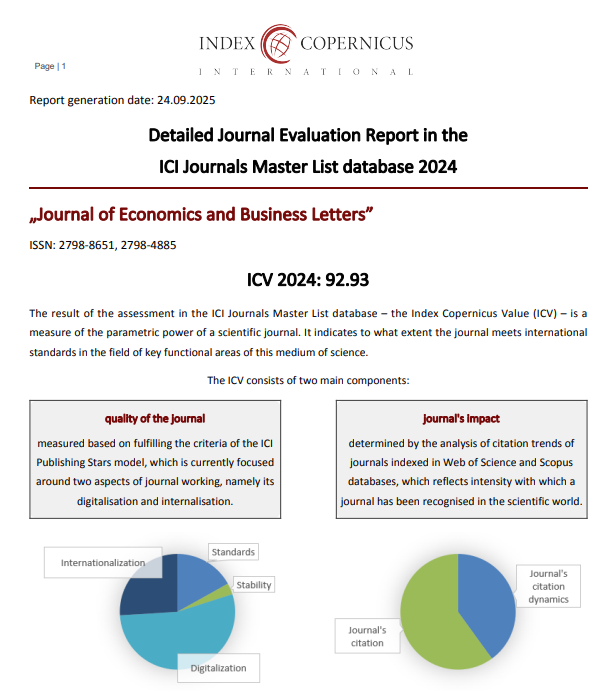Job promotion, staffing, and competence as drivers of employee performance: Evidence from Indonesia’s directorate general of national export development
DOI:
https://doi.org/10.55942/jebl.v5i3.861Keywords:
job promotion, staffing, competence, employee performance, public sectorAbstract
This study examines how three human resource levers—job promotion, staffing/procurement, and employee competence—shape performance among civil servants at the Directorate General of National Export Development (DITJEN PEN), Ministry of Trade. Using an explanatory, cross-sectional survey of 154 employees (simple random sampling), we operationalized constructs on 5-point Likert scales and verified measurement quality via corrected item–total correlations and Cronbach’s alpha (all α ≥ 0.70 after two weak competence items were dropped). Correlational and regression analyses show that competence is the dominant predictor of performance (r = 0.676; β = 0.599, p < 0.001), job promotion has a positive but small effect (r = 0.181; β = 0.093, p = 0.025), and staffing/procurement perceptions are not statistically significant (r = 0.047; β = 0.016, p = 0.724). The full model is strong (F = 45.583, p < 0.001) with R² = 0.477, indicating that the three levers jointly explain nearly half of performance variance. Managerially, returns are highest from targeted competence development aligned to role demands, while promotion processes should be made more timely and transparently merit-based; staffing practices need re-engineering around person–job fit to reveal their contribution to performance. Limitations include cross-sectional design and perceptual measures; future work should integrate administrative data and test mediated pathways (e.g., staffing → competence → performance).
References
Arikunto, Suharsimi (1997) Prosedur Penelitian: Suatu Pendekatan Praktek, Edisi Revisi, Jakarta: Rineka Cipta.
Campion, M. A., Fink, A. A., Ruggeberg, B. J., Carr, L., Phillips, G. M., & Odman, R. B. (2011). Doing competencies well: Best practices in competency modeling. Personnel Psychology, 64(1), 225–262. https://doi.org/10.1111/j.1744-6570.2010.01207.x
Ghozali, Imam dan Fuad (2005) Structural Equation Modeling. Teori, Konsep dan Aplikasi, Badan Penerbit Universitas Diponegoro, Semarang:
Jiang, K., Lepak, D. P., Hu, J., & Baer, J. C. (2012). How does human resource management influence organizational outcomes? A meta-analytic investigation of mediating mechanisms. Academy of Management Journal, 55(6), 1264–1294. https://doi.org/10.5465/amj.2011.0088
Kristof-Brown, A. L., Zimmerman, R. D., & Johnson, E. C. (2005). Consequences of individuals’ fit at work: A meta-analysis of person–job, person–organization, person–group, and person–supervisor fit. Personnel Psychology, 58(2), 281–342. https://doi.org/10.1111/j.1744-6570.2005.00672.x
Mwagike, Leonada Raphael. (2025). Staff competence and job performance of public procurement entities: The moderating role of regulatory compliance. Asia Pacific Journal of Public Administration. https://doi.org/10.1080/12294659.2025.2463133
Rahmat, B., Hartanto, B., & Hilman, A. (2024). Bureaucratic reform in Indonesia: From “public administration” to “public management.” Journal of Local Government Issues, 7(2), 144–158. https://doi.org/10.22219/logos.v7i2.33848
Republik Indonesia. (2000). Peraturan Pemerintah No. 97 Tahun 2000 tentang Formasi Pegawai Negeri Sipil (diubah dengan PP No. 54 Tahun 2003).
Republik Indonesia. (2000). Peraturan Pemerintah No. 98 Tahun 2000 tentang Pengadaan Pegawai Negeri Sipil (diubah dengan PP No. 11 Tahun 2002).
Republik Indonesia. (2000). Peraturan Pemerintah No. 100 Tahun 2000 tentang Pengangkatan PNS dalam Jabatan Struktural (diubah dengan PP No. 13 Tahun 2002).
Republik Indonesia. (2011). Peraturan Pemerintah No. 46 Tahun 2011 tentang Penilaian Prestasi Kerja PNS. Badan Kepegawaian Negara. https://peraturan.bpk.go.id/Details/5179/pp-no-46-tahun-2011 BPK Regulation
Republik Indonesia. (2019). Peraturan Pemerintah No. 30 Tahun 2019 tentang Penilaian Kinerja PNS. Badan Kepegawaian Negara. https://www.bkn.go.id/wp-content/uploads/2019/05/PP-Nomor-30-Tahun-2019.pdf
Sugiono (2004) Metode Penelitian Bisnis Alfabeta, Bandung
Wihantoro, Y., Lowe, A., Cooper, S., & Manochin, M. (2015). Bureaucratic reform in post-Asian crisis Indonesia: The Directorate General of Tax. Critical Perspectives on Accounting, 31, 44–63. https://doi.org/10.1016/j.cpa.2015.04.002
Downloads
Published
How to Cite
Issue
Section
License
Copyright (c) 2025 Herna Dwi Apriyanti

This work is licensed under a Creative Commons Attribution 4.0 International License.
















